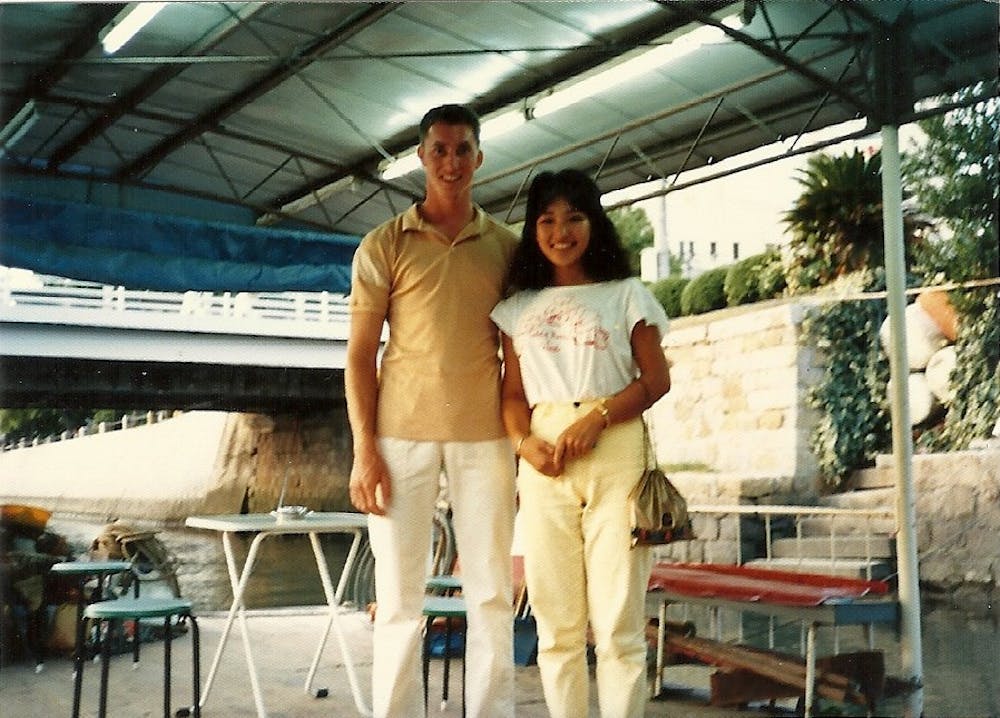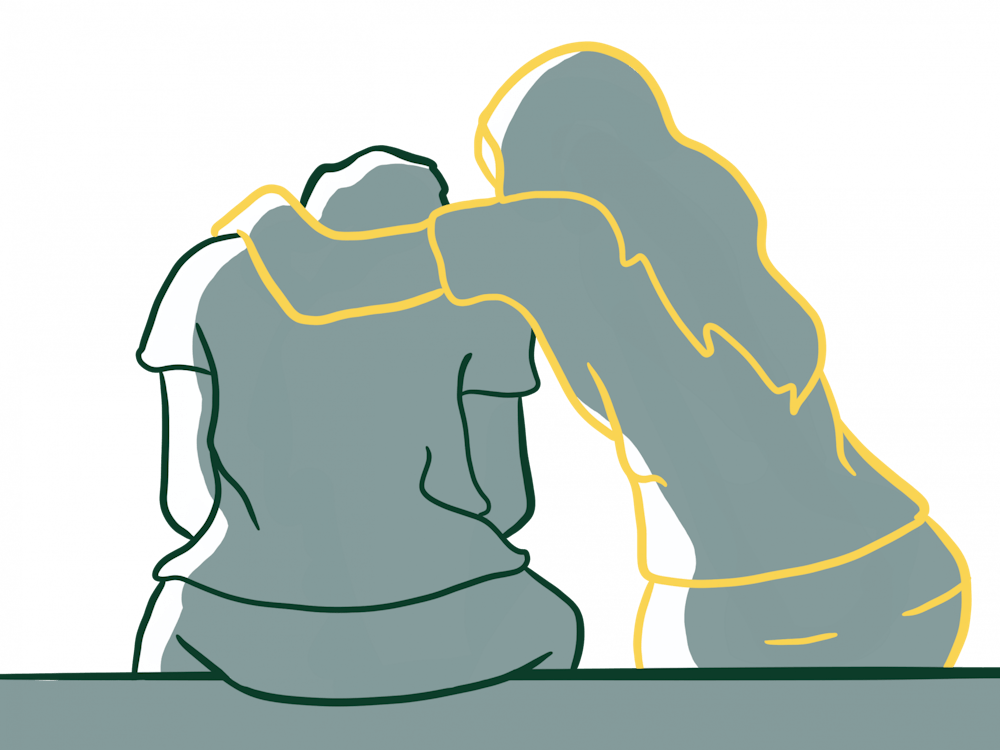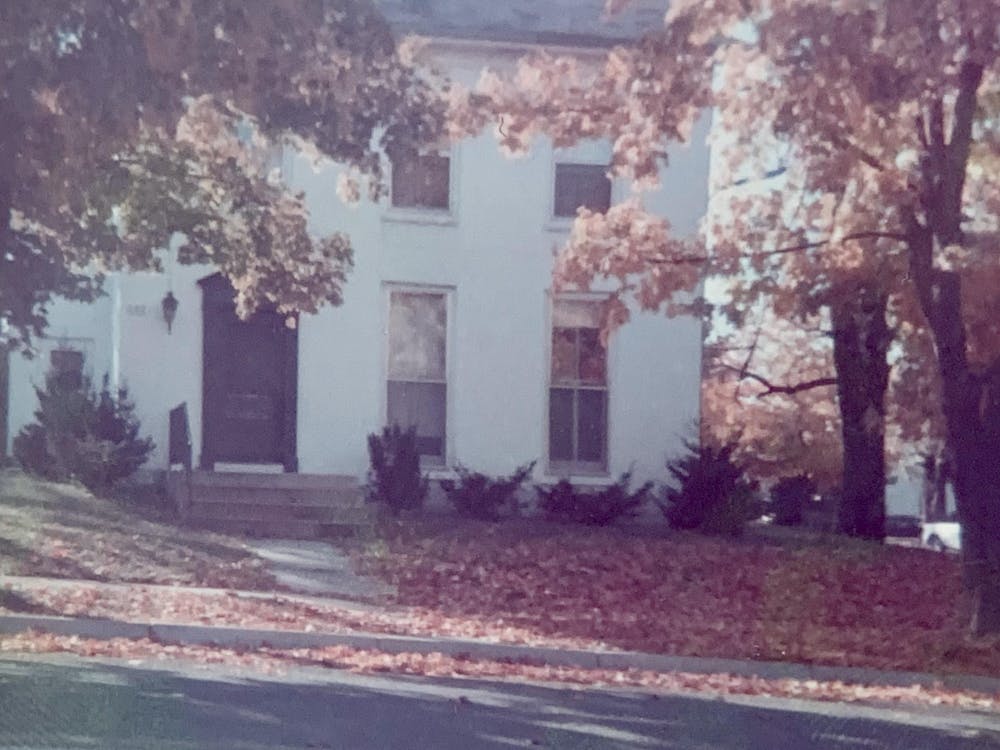My mother Kumi always said she wasn't "typical Japanese." She wore colorful A-line skirts and ruffled blouses and high heels that would click professionally across the floors of one of Hiroshima's top sake companies where she worked. She wore bold lipstick and permed her hair. Often times her older brother's friends would mistake her as "Chiaki's older sister," only to be sternly corrected later. As a secretary, she learned how to organize her boss's perpetually disorganized schedule; how to calmly escort a member of the Yakuza with a "message" for her boss away from the company; and how to survive the company's drinking nights (order sake, she told me with a sly smile, because it comes in a smaller glass. Then always offer to pour for everyone else so they're too drunk to notice you haven't drank as much).
She also had to learn English.
Despite signing along to foreign songs when she grew up in Hiwa town to improve her language skills -- she knows "Feliz Navidad" better than I do -- English was not her language of choice. She wanted to learn French: the language of love, the most beautiful language, the language spoken by most of her fashion icons, including Audrey Hepburn. English was the language of Americans. She never wanted to go to America, and English was the language that everyone learned. But, as the secretary, she needed to be able to direct foreign clients and business partners, so she reluctantly sought out an English class.
The first class she found was awful. The location was close, the director was helpful, but the man hosting the discussion was snide and rude. She contemplated finding another class, but the commuting distance made her search difficult. In the end, she called the director and asked if the same volunteer teacher would be there. She was pleased to discover that the previous week was his last, and agreed to give the new volunteer a shot.
Charlie Day was a clean-shaven, short haired, rather tall (in comparison with most Hiroshima people) United States Marine, based at the Marine Air Corp Station in Iwakuni. He volunteered to help Kawai-san facilitate the English discussion class as a way to interact with the community and get away from the base.
A few classes later, the "gai-jin" teacher asked my mom out on a date in the stairwell, while the rest of her English class watched from above and giggled like middle schoolers.
It was a long-distance relationship somehow upheld without the technology of today. Their few "dates" in Japan consisted of sight-seeing or helping pick out earrings for Grandma. My mom always kept a pocket Japanese-English dictionary with her, tucked in her purse next to her train schedule so my father wouldn't get lost on the railways. My mother once traveled to California to visit my father when he was stationed along the coast. Somewhere in the drawers of neatly organized film photos -- "we didn't have your fancy i-Dudes back then," my dad said -- there are photos of their trip to Disneyland, and a picture of my parents dwarfed next to a redwood tree.
But the ocean between them kept their dates few and far between. They kept in touch through letters and packages.
"His were like novels," my mom laughed. "Like 'Monday, I did this and this. I thought this. Tuesday, I yadda yadda.' Mine were so short because my English wasn't that good."
My father would send her cassettes of his favorite songs ("Drive" by The Cars). He even managed to send flowers to her office in the sake company, which thoroughly amused her boss and successfully warded off any potential rivals.
After arm-wrestling my Ojiichan for his approval ("if you lose, the answer is no; if you win, the answer is still no"), my father proposed to my mother in the Hiroshima Peace Park. To move to the United States as my father's fiancee and obtain a green card, however, was even more confusing than my Ojiichan's playful challenge. It was too complicated and too long a process. To move as a spouse, however, was much simpler. They were legally married in Osaka a few months later.
My newly-wed parents moved to Canton, Ohio. My father was on reserve for the Marines, and employed as a city firefighter. My mother quickly learned that America was not like Japan. She learned that it was not as safe to walk the mile to Giant Eagle for grocery shopping. She learned she might be followed. Once, she was followed by a man yelling things out the car window at her. My father was at one of his 24-hour shifts at the fire department, and she did not want to return to the apartment alone. She approached the first person she saw -- an older woman gardening in her front lawn -- and tried to tell her what was going on in broken English. The woman understood and allowed my mom to sit with her on her porch until the car left. She learned she could not hold her wallet out in the open like she could in Japan. She learned that driving was the only way to travel anywhere outside of the neighborhood.
Enjoy what you're reading?
Signup for our newsletter
And she learned that English was a necessity.
Everything was different in America, and everything was in English. She went from organizing her boss's schedules, taking phone calls, balancing checks, discussing ancient Japanese literature, completing an associate's degree, and taking part in everyday conversation to being lost in the rapid-fire English surrounding her. When my dad's family attempted to speak to her, she felt embarrassed because she couldn't understand. Even ordering pizza over the phone was a challenge -- she wrote out the order and practiced saying it before even dialing the number.
"You feel like you are nothing," she told me. "You see a four-year-old speaking better English than you, and I can't say anything. I thought I was going insane."
My dad brought home an ad for an English as a Second Language class with a woman named Betty that was held at the Jewish center. It was a last-ditch effort, and my mother agreed.
What she got was more than an English class. She met other adults that had immigrated to the United States -- from Russia, Mexico, Ukraine, Turkey, and more -- and realized that she was not insane.
Other people knew what it felt like to be lost in a society where they didn't speak the same language, what it felt like to be nervous just to greet someone. The class became a therapy session, a surrogate American family that not only tackled the impossible rules of English grammar, but also the American tax system, government and unspoken social rules. When one woman became engaged to an American man, the women of the class insisted that she bring him into the class so that they could make sure he was "good enough" for her (he was approved at the end of class).
The class was a turning point for my mother. She became a U.S. citizen. She was on the committee for the Canton Art Museum's "Kimono as Art" display. Her English is near perfect. She handles the money in the house. She has successfully raised three daughters -- one who is currently an English teacher in South Korea and another that is planning on going to art school after graduating high school. She found a way to balance our Japanese heritage with our American heritage, proudly celebrating both -- eating traditional New Year's food to promote longevity as we watch the ball drop at midnight; celebrating Hinamatsuri in March and Memorial Day in May; watching "Anpanman" and eating chicken noodle soup when we were sick. My mother has kept us together.
I do not know all of the challenges she faced (and continues to face) by completely relocating her life to a different country and having to learn a completely different language. I will never know the full extent of what she went through. But I do know that, despite the hardships, she has never failed me, or my family once.
Fate and the alignment of random stars may have brought us all here by wild chance, but she supports us, strengthens us and keeps us together. Her maiden name, Tachibana (\0x7ACB\0x82B1) -- standing flower -- is poetically appropriate: she has dug strong roots here despite the challenges, and has blossomed in the woman I am lucky enough to call my mom.
\0x304A\0x6BCD\0x3055\0x3093\0xFF1A\0x611B\0x3057\0x3066\0x308B\0x3088\0x3046\0x301C




